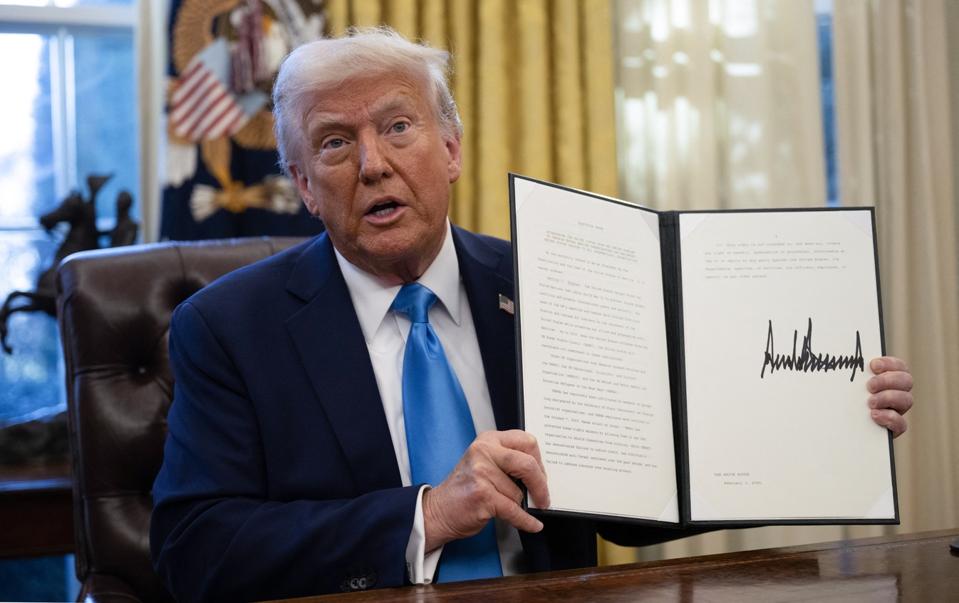A lot is at stake right now for U.S. businesses. With a volatile market and economic uncertainty driven by an escalating trade war, many companies that trade and invest overseas say they’re facing an existential crisis.
Perhaps overlooked in the flurry of executive orders in Trump’s first three months is one he issued in February directing a 180-day review of U.S. participation in international organizations and treaties to evaluate their alignment with our interests. The order presents an opportunity to reform agreements and relationships that can benefit U.S. businesses, especially regarding rules for involving private sector stakeholders.
Historically, many international institutions have limited U.S. business engagement and, in some cases, barred business observers. The administration can show it’s taking steps to make America stronger and more prosperous by enlisting and encouraging private sector involvement in these treaties and organizations. If considered thoughtfully and intentionally, the administration and U.S. companies can shape international rules and standards in ways that support American competitiveness and give them expanded opportunities in global markets.
In my role steering policy on issues such as health, labor, and environment at the U.S. Council for International Business (USCIB), I see firsthand the importance of actively engaging with international entities on behalf of U.S. businesses. USCIB promotes U.S. business interests from every economic sector to policymakers and regulatory authorities worldwide. If we withdraw entirely from treaties and multilateral institutions such as the OECD and the United Nations, we risk ceding more power and influence to China. That shift would allow an adversary to set the agenda and global norms. Many of these treaties are binding and enforced globally, regardless of U.S. domestic policy, and could significantly affect the bottom line of American multinational corporations. “U.S. businesses have always counted on the U.S. government to lead in these forums to ensure better outcomes for Americans,” said USCIB’s CEO Whitney Baird this week via email.
Why Sitting Out Costs More: U.S. Absence in Global Shipping Accord Leaves Businesses Vulnerable
Just this month, an accord was reached under the International Maritime Organization – a United Nations agency – that would require every ocean-going cargo ship to cut greenhouse gas emissions or pay a minimum fee of $100 for every ton emitted. This binding agreement marks the first global tax on greenhouse gas emissions and applies even to ships registered in the U.S.
The Trump administration decided to pull out of negotiations because they believe this agreement would burden the sector with added shipping fees that would drive up consumer prices and lead to inflation. It could also raise operating costs by boosting freight rates, squeezing margins for U.S. exporters and importers reliant on maritime transport.
Notably, countries like China and Russia remained in the accord. American proactive involvement in setting these global standards could have led to more favorable policies for U.S. companies.
Digital Trade at Risk: Why U.S. Leadership in Global Digital Economy Matters Now More Than Ever
Continued engagement in international organizations and treaties is particularly critical in advancing American business interests in the global digital economy. In the World Trade Organization, the U.S. has played a vital role in preserving the e-commerce moratorium, which prevents customs duties on electronic transmissions including emails, software downloads, digital media (like music or movies), financial data, and cloud computing services. The moratorium is especially important for U.S. businesses – manufacturing, entertainment, software, financial services, semiconductors and more – that transmit products and services electronically and rely heavily on the free flow of data around the globe.
With the moratorium under real threat ahead of the WTO’s 2026 Ministerial Conference (MC14), the U.S. needs to lead through consistent and coordinated efforts. The Trump administration has made a permanent moratorium a top priority, and renewed engagement at the World Trade Organization on digital trade could help advance meaningful rules governing cross-border data flows. This contrasts with the Biden administration’s pullback on digital trade issues, which has contributed to stalled outcomes on both the JSI and the moratorium.
Separately, U.S. manufacturers face high stakes in global treaty talks on chemical, product and waste regulations. International agreements such as the Basel, Rotterdam and Stockholm conventions establish global standards that directly affect American companies’ ability to market products abroad and manage reverse logistics and material recovery.
“The Business of America is American Business”
Trump’s proactive involvement in these organizations could influence them to benefit American businesses. Unfavorable outcomes could restrict U.S. access to key international markets, reduce global competitiveness and cut into profits. They may also drive up compliance costs and create obstacles to participating in global supply chains, making it more difficult for companies to collect, recycle and reuse critical minerals and raw materials.
The Trump administration has shown that binding and non-binding international agreements out of multilateral institutions directly affect industries as varied as food and beverage, energy, technology and life sciences. By setting common practices and standards, international treaties shape how companies innovate, invest and create jobs. While reforms are necessary, strong leadership and active participation in global organizations remain critical to national interests and the American business community. Given the shared goal of the administration and the private sector to promote prosperity and business, there is a unique opportunity to work together to enact reforms and influence policy in the multilateral system to put America first.
As President Calvin Coolidge famously declared in 1925, “The business of America is business.” A century later, that principle remains just as relevant. To ensure continued economic growth and global competitiveness, the United States must prioritize its business interests on the world stage. Multilateral institutions—where international rules and standards are shaped—offer a critical platform to protect and advance those interests. Staying engaged isn’t just smart policy; it’s essential for the future of American enterprise.

